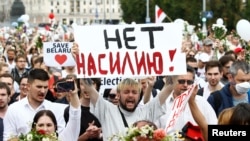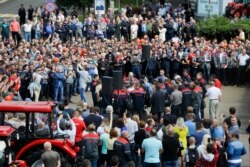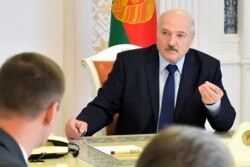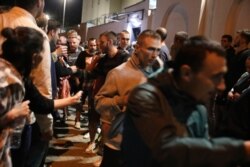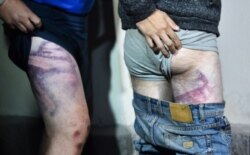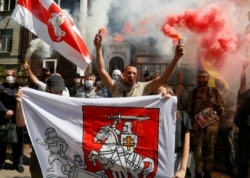Uncertainly hovered over Belarus on Friday as protests against President Alexander Lukashenko gained momentum — with tens of thousands disputing the Belarusian strongman's claim of a landslide victory during an August 9 election marred by voter fraud and a crackdown against unarmed demonstrators.
Indeed, while the past 36 hours witnessed fewer arrests than the days following the vote, there were a flurry of developments suggesting resistance to Lukashenko's rule was spreading.
Across the country, thousands of Belarusian women and medical workers gathered along roadways holding hands to demand an end to the violence — a tactic that seemed to neutralize police who previously had gone after demonstrators with startling aggression.
Key factories announced they were entering work stoppages until Lukashenko had resigned — in several cases rejecting entreaties to return to work from plant directors loyal to the government.
By late Friday, workers had walked off the job to join with protesters in a peaceful sit-in in front of the main government building in Minsk.
Meanwhile, seemingly everywhere, Belarusian drivers honked their horns in what has become a ritual form of expressing disgust with the longtime Belarusian ruler.
Svetlana Alexievich, the country's Nobel laureate in literature, also publicly called on Lukashenko to step down before he plunged the nation into civil war.
"You just want power and your desire will end up with blood," she said in an interview with VOA partner Radio Free Europe/Radio Liberty.
On Friday, Lukashenko addressed rumors — never substantiated — he had indeed vacated the presidency.
"For starters, I'm still alive and in the country," said Lukashenko as he began a meeting focused on the work stoppages.
He later repeated claims that the growing revolt was due to provocateurs from Europe and Russia's opposition.
"They're using your children as cannon fodder," said the Belarusian strongman.
Questionable victory
The political standoff stems from an August 9 presidential vote in which Lukashenko claimed 80% of the vote — an astounding result given the election was supposed to have been the most serious challenge to his 26-year rule.
His primary challenger, Svetlana Tikhanovskaya — a schoolteacher who only entered the race after her husband was barred from the election and arrested — had electrified huge crowds in the run-up to the vote.
Joined by the wives of two other banned candidates, they rallied the country around a simple promise: to hold real elections within six months of winning the presidency.
But Tikhanovskaya received less than 10% of the vote — with widespread evidence of vote-rigging triggering protests.
After initially insisting she would contest the results to the state election commission, she fled the country Tuesday hinting at threats to her family.
Yet she reappeared again in a video released Friday from exile in Lithuania.
"Belarussians no longer want to live with the previous ruler. No one believes in his victory," said Tikhanovskaya.
"We need to stop the violence on the streets of Belarusian cities. I call on the authorities to stop this and enter into dialogue."
The announcement came shortly before the state election commission formally endorsed Lukashenko's victory as final.
State torture
Since Sunday, authorities have reported almost 7,000 arrests — with hundreds injured, and two reported deaths resulting from clashes between demonstrators and police.
Activists report some 1,500 people have gone missing.
Yet hundreds of prisoners, maybe close to 1,000 according to some reports, were released from Minsk's central Okrestina prison late Thursday, bearing grim accounts of torture at the hands of police.
"They beat them like animals. There was a sea of blood," said one woman, as she exited the facility in a widely shared video.
Many broke into tears upon being reunited with family members waiting outside the prison walls.
U.N. Spokesperson Stephane Dujarric said during the Friday daily remote briefing, "The Secretary-General continues to follow the situation in Belarus very closely. We welcome the reported release of some of the detainees last night and urge this to continue. We are deeply disturbed about the reports and allegations of torture and mistreatment of persons under detention, including young people and journalists.
"We take note of the statement of regret by the Minister of Interior of Belarus regarding the use of force and expect these incidents and claims to be investigated thoroughly. We remain in touch with Belarusian authorities in New York, Geneva and Minsk regarding the unfolding situation," Dujarric said.
Nikita Telizhenko, a journalist for Russia's znak.com news service, described his own dark odyssey inside the prison in graphic detail.
"People were lying on the floor like a living carpet, and we had to walk right over them," wrote Telizhenko.
"'Everyone on the floor face down,'" they yelled at us. And I understood there was nowhere to lie, all around me lay people in pools of blood," Telizhenko wrote.
Social media channels were flooded with images of police violence from the past few days.
There were videos of masked security firing rubber bullets at seemingly innocent passersby. Other clips showed groups of OMON troops descending on unarmed protesters with kicks and truncheons. And everywhere on social media, users shared photos of dark bruises received at the hands of police.
"I've never seen bruises like this in my life," said Anton Gashinsky, a lawyer who visited the prison, in an interview with VOA.
The head of Belarus's Interior Ministry, Yuri Karayev, later apologized to those "accidentally" swept up by the police.
"Provocateurs are making it so that the people hate us," said Karayev.
"But the majority of the population doesn't support the protests," he added.
International response
Foreign Ministers from the European Union met Friday in Brussels and agreed to levy sanctions against members of Lukashenko's government responsible for human rights violations.
U.S. Secretary of State Mike Pompeo has suggested the U.S. may join allies in introducing penalties against the government in Minsk.
Meanwhile, Russia reiterated its support for Lukashenko — essentially doubling down on an earlier decision by President Vladimir Putin to join China among major powers congratulating Lukashenko on his reelection to a 6th term in office.
Russia's Foreign Ministry released a statement saying it was concerned about "unprecedented pressure" by foreign states to interfere in the internal affairs of Belarus "with the goal of dividing society and destabilizing the situation."
The Kremlin gesture came despite thorny relations between nominal allies over issues such as Lukashenko's response to the coronavirus, gas prices, and a long-stalled creation of a supra-state union between the two countries.
Most recently, Lukashenko and the Kremlin clashed over the arrest of 33 alleged Russian mercenaries — with the Belarusian leader accusing Moscow of attempting to sow chaos during the election.
Yet, in a sign that he was now looking to quickly patch up any lingering resentments in Moscow as his own crisis in Minsk grew, Lukashenko issued an order late Friday night.
The alleged Russian mercenaries were suddenly heading home.
VOA U.N. Correspondent Margaret Besheer contributed to this report from New York.




